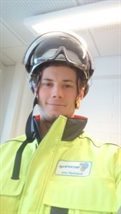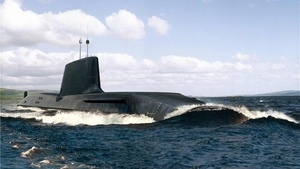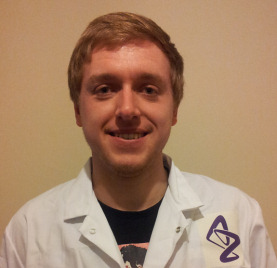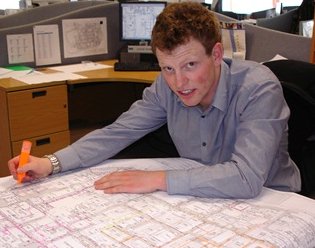Industrial liaison tutor
The school has an Industrial Liaison Tutor, Dr Richard Greenwood, who co-ordinates year-out placements, vacation employment and sponsorship. This role also involves advice on graduate employment / postgraduate study placements for final year undergraduate students.
The job market in science and engineering is competitive, so it is important to enhance your career prospects by taking every opportunity to come into contact with industry and gain suitable experience.
To assist students in obtaining work placements, the University has a Careers Network which contains databases on placements and graduate employment opportunities. This database is updated regularly and is a major asset to students searching for employment opportunities. For up to two years after graduation, you can access our full range of support at Careers Network.
The major chemical engineering companies visit the University of Birmingham every year and offer graduate employment, vacation employment and sponsorship to Chemical Engineering students.
Industrial sponsorships and summer placements
 What's an industrial placement like?
What's an industrial placement like?
An industrial placement is a great way to experience work and enhance your career prospects. But what is it like? What do you do on a placement? John, one of our students, wrote a blog about his period in industry.
Read John's blog
The reputation of Chemical Engineering at Birmingham and the school's strong links with industry means that many companies, particularly the large multinationals, approach the school with the aim of offering sponsorships or summer placements to students. Generally the sponsorships are aimed at penultimate year students, that is second year BEng students and third year MEng students. However, those considering the MEng degree should still apply in their second year for summer placements.
Sponsorships usually consist of a financial reward possibly with summer vacation placements. Often the projects assigned to students carry a high level of responsibility and frequently companies will follow-up suggestions made by students. Many companies require students to produce formal reports on their work and give presentations. Some of the well developed placement schemes will send vacation students on training courses to enable them to improve report writing and presentation skills.
Applications forms for sponsorship become available early in the academic year. Most of the interviews take place at the University during the first term. Some companies make it their policy to interview all students simply to give everyone practice. The first round interviews are rarely of a technical nature, interviewers tend to ask candidates to expand on what has been written on the application form. Although academic performance is important, it is not necessary to be top of the year to be awarded sponsorship. A range of interests, hobbies, previous work experience, etc. are equally impressive. Interviewers are particularly keen on activities where candidates have shown leadership or teamwork! Following the first round of interviews, a shortlist of candidates may be invited to attend an assessment centre after which sponsorships are awarded to the successful candidates.
Chemical Engineering with Industrial Study
Students have the opportunity to work for a year in industry whilst studying at Birmingham, which can be taken as a pre-university year through the Year in Industry scheme (details are available from your School) or as a placement at the end of your second year of study at Birmingham. At Birmingham, each student is assigned a member of academic staff as a mentor, who visits the student at regular intervals during the placement. Upon completion, students submit a final report on the project which is assessed as part of the degree. Follow this link for more information on the Industrial Experience programme.
The placements offer the opportunity to work for a chemical engineering company and earn a salary. This option is becoming increasingly popular with both pre-university and second year students, and is an extremely useful method of gaining relevant work experience, which can only improve subsequent employability. Some of the companies that have participated in the scheme are listed below.
Joshua Bailey
BAE Systems Submarine Solutions – Barrow-in-Furness
Industrial Placement Feedback - Joshua Bailey
For my Year in Industry, I worked at BAE Systems Submarine Solutions. This placement was at the end of my second year. BAE Systems Submarine Solutions are based in Barrow-in-Furness and over the course of the year I worked both in project management and engineering. The project management role involved managing a large IT project and gave me a great deal of responsibility. The engineering placement allowed to me to use the engineering principles that I had learnt at university designing the propulsion system in the submarine.

For the year I was paid £16,800 and offered sponsorship for my degree (£1,500 for each of the final two years) with a place on the graduate scheme after I have finished my degree. The industrial placement gave me a great insight into industry and I would recommend it to anybody doing an engineering degree. Not only does the placement give you an insight into the company, it allows you to apply your degree in a practical manner.
James Barlow
Imerys – Cornwall
My 12 month industrial placement was spent working within the mining and minerals processing industry with Imerys. Throughout this work I was directly involved with lab scale research along with pilot and full scale optimisation at numerous sites located within and outside of the UK. All of this along with experience in the commissioning of a full scale plant provided me with an invaluable insight in the industrial development and progression of a product from its initial conceptual development to its final production. I was trusted with real responsibilities throughout my time with Imerys and allocated my own projects to undertake and develop.
This placement was based in Cornwall, but I would frequently spend prolonged amounts of time working abroad as part of an international development team. Throughout this work I gained even more valued experience working within different disciplines of the industry alongside experienced engineers. This allowed me to develop my engineering knowledge in a hands on environment whilst also advancing my time management, organisational and practical skills.
I was paid £18,000 for my placement and had access to a company gym whilst in the UK and had all of my travel and living expenses covered whilst working out of the country. I would thoroughly recommend this placement to anyone who is considering a job in the growing mining industry or who wants to expand their knowledge in a practical environment and is looking for a challenge.
Matthew Bridgeman
Tata Steel – Port Talbot
Tata Steel offered me a one year placement between my 2nd and 3rd year. I was based at their steelworks in Port Talbot and lived in Cardiff for the year. I was involved with the day to day running of the blast furnaces on site and tasked with setting up a heat and mass balance for the furnaces. I was required to present my findings on a weekly basis and suggest any process changes the results suggested were necessary.
I was paid £16,000 for the year and had use of the subsidised cafeteria. The industrial experience taught me a lot about time management, working in a team and being flexible. This coupled with the academic content of the course gave me an excellent foundation for a career with Tata Steel who subsequently offered me a job on completion of the course. They have also agreed to sponsor me for my final two years at university. I would recommend an industrial placement to any student as the advantages when applying for jobs are undisputed.
Matthew Butel
EDF Energy Nuclear Generation – Gloucester
EDF Energy Nuclear Generation offered me a pre-degree placement, where I worked in the central engineering support division based in Gloucester. During this year I successfully completed the certificate in industrial studies and was offered sponsorship from EDF for part of my degree.
This allowed me to undertake a placement in the summer of my first year based at Heysham 1 Nuclear Power Station. Throughout my placements I have been involved in a range of projects. These include metal loss calculations for boiler superheater tubes, reporting on the effectiveness of corrosion control measures in cooling water pipework and validating a mathematical model for calculating hydrogen concentration in reactor gas using current plant data. I have also been involved in boiler tube inspections and routine chemical monitoring and sampling whilst working on site.
I was paid the equivalent of £ 15,000 per annum for my placement in addition to the degree sponsorship. I have also had use of company vehicles and hotel accommodation when working away from my base location. My experiences in industry have helped to cement the theory covered in my studies at Birmingham in addition to teaching me about the world of work and how to work within a group of engineers. I will also be undertaking placements at the end of my second and third years as part of my degree sponsorship.
In my experience of industrial placements there have been no drawbacks. Moreover, it gives direction to future career paths and provides an excellent opportunity for engaging with future employers. I have thoroughly enjoyed my placements and look forward to my next one, especially as there are excellent prospects for the UKs nuclear industry in coming years.
Chandni Chavda
PepsiCo International – Leicester

I completed my one year industrial placement after my third year of studying. I worked at PepsiCo which is based in Leicester. My role was a process redesign technician and this meant optimising the manufacturing process as well product development.
During my year, I worked in different factories where they produced Walkers crisps alongside the operations team on critical trials for the company. I had the opportunity to work abroad in three different countries which was a very exciting experience. I was paid £16,000 for the whole year and there were many added benefits involved with this programme. There was a gym on site which I could use for free, a subsidised canteen, free crisps available at all times and also social work events.
I learnt and developed many skills whilst working at PepsiCo. I was in charge of my own projects, therefore improved my project management as well as leadership skills. I had the chance to work abroad, therefore adapted to new environments and cultures. I gained confidence in interacting and presenting to senior levels of employees. I was able to use my knowledge learnt from my degree and apply that to real life scenarios which was an added bonus for me.
PepsiCo do not have any graduate roles, therefore, I was not offered a job. I will definitely apply for a direct entry role closer to the time of my graduation. This is one placement which I would recommend to all students. The placement has a lot of benefits and overall, I had a very rewarding experience.
Adam Crennell
AstraZeneca - Macclesfield

The placement was focused mainly on research and development and offered experience in both lab and plant work. During this time, I worked on a variety of high priority projects. I found this very exciting and relished the challenges that I was faced with on a daily basis. Having limited knowledge of the pharmaceutical industry before the placement, I had to quickly learn and adapt to my surroundings.
One of my main responsibilities during my time at AstraZeneca was coordinating the use of a small scale spray dryer. This was used for the screening of new API (Active Pharmaceutical Ingredients) and excipient (tablet filler) formulations for poorly soluble (drugs which do not dissolve well) research. The material I produced was used for important stability and dissolution testing to assess the viability of using solid dispersions for a number of different compounds.
Whilst at AstraZeneca, I was asked to evaluate a piece of equipment that was on loan from the manufacturer. The aim of the evaluation was to determine if the company should, or should not, invest in the equipment. In order to make the evaluation as thorough as possible, I arranged a meeting with people with the right expertise in the field. During the meeting I explained clearly the aims of the project and encouraged the group to generate as many ideas as possible. From this meeting, I was able to determine a number of relevant criteria that the equipment had to satisfy in order to meet the needs of the department.
As well as time in the lab, I also spent time working with a senior process engineer on the site pilot plant. The main focus of this work was the commissioning of a number of pieces of ancillary equipment which involved producing drawings of the required work, meeting with a number of engineers and then assessing whether the installation was completed correctly and was safe for use. I found this working very interesting and it motivated me to further pursue a career in chemical engineering.
I was paid £16,000 for the placement and I would recommend the placement to students who wish to peruse a career in R&D or the pharmaceutical industry, or both!
Rikesh Doctor
Reckitt Benckiser – Hull
Reckitt Benckiser offered me a year vacation placement at the end of my second year, and I was based in Hull working on the leading depilatories brand, Veet. The work I was involved in was manufacturing and testing Veet cream.
I was paid £15,500, for the year and had use of the company gym and subsidised cafeteria. The industrial experience taught me a lot about time management, working in a team and being flexible. This coupled with the academic content of the course gave me an excellent foundation for a career with RB who subsequently offered me a job on completion of the course.
I would recommend an industrial placement at RB to any student as the job market is competitive and the placement offers enhanced career prospects.
Lucy Harman
GlaxoSmithKline - Ware
I undertook an Industrial Placement with GlaxoSmithKline after my second year of study, based in the Hertfordshire town of Ware. My role was a Process Engineer working as part of the Technical team at a Global Manufacturing and Supply site. I was involved in both the respiratory and oral solid dose (essentially tablets) supply chain representing the process engineering team and providing technical knowledge to problem solving exercises dealing with issues in manufacturing.
I was also involved in working on projects to install new equipment which involved working with external suppliers. Other work I was involved in included supporting the manufacture of new products for clinical trials and creating an engineering walk through of certain unit operations. On the whole the job was based 50% in the office and 50% in production.
My salary for the year was roughly £16,000 and there was a gym, subsidised café and a sports and social club on site. The year has helped to develop my skills and provide me with practical engineering experience. For example, I have learnt the importance of planning and organisational skills, teamwork and especially communication, as well as how to dismantle and reassemble a machine. On completion of the year there is an option to be ‘fast-tracked’ for the graduate scheme which means that there is only an assessment centre to complete.
I would recommend this Industrial Placement to students because practical engineering experience is invaluable and it will develop your skills in preparation for the graduate workplace.
Charlotte Iosson
PepsiCo International R&D – Leicester

I spent a year working at PepsiCo International R&D in Leicester. I worked on an ongoing project designing and trialling new pilot scale machines which was part of a brand new Walkers crisp product. I was paid £16 900 and I got 24 days holiday over the year. There was a free onsite gym which also ran a range of fitness classes, a fairly cheap cafeteria and there was always a new product or food to taste for “marketing” purposes! Plus if you knew the right people then there was a lot of spare product that was nearing the use-by-date and had to be eaten!
There were 14 students in total doing a placement so there was always someone that was in the same boat as you if you ever felt a bit lost. I gained a lot of experience commissioning machinery into the pilot plant, was able to manage a small team to improve my leadership skills and I learnt how to carry out HACCP and HAZOP studies based on real life process lines.
Unfortunately PepsiCo do not run a Graduate Scheme at the moment and expect a couple of years experience before applying for a job, however this is potentially changing in the near future. I would definitely recommend this placement to get experience in a food manufacturing environment and it is full of friendly employees who are keen to help and push you to achieve your full potential.
Fay Lashbrook
Sellafield Ltd – Manchester
I completed a year in industry with Sellafield Ltd in their Manchester design office. I worked in the effluents and encapsulation plants team delivering engineering solutions to operational problems and designing new systems for ongoing projects. I gained both office and plant experience and was paid £14,000 for the year, this has since been raised to £16,500. As part of your placement you are provided with an IChemE mentor to help you prepare for chartership and a graduate buddy to help you settle in.
I gained valuable experience, some good friends and a better understanding of what I wanted to do after graduation.
I was invited to complete a graduate assessment centre towards the end of my placement which I passed meaning I will be offered a job if a suitable position becomes available on my graduation year. I would recommend the placement to anyone who is interested in the nuclear industry or wants real chemical engineering experience. I really enjoyed my year.
Lincoln Smith
Dow Corning – Barry, South Wales
In November 2010, Dow Corning, a world leading supplier of silicones and silicone based products, offered me a year placement in the Environmental Group on their Barry Site in South Wales. I was paid £19,000 for the whole year.

The work allowed me to apply my academic chemical engineering knowledge to an industrial environment, working on pressure drop calculations, writing procedures, and carrying out environmental improvement projects. The placement allowed me to understand the scale of operations on a manufacturing site. It provided me with hands on technical experience, as well as the opportunity to refine my soft skills such as time management, and team working.
Initially I was unsure about taking a whole year out of my study, favouring a shorter summer placement. A combination of the opportunity for hands on engineering experience on a UK chemicals site, and close proximity to Cardiff swayed my decision in favour of the longer placement. It is a decision which I have not looked back on. It has also helped me to secure a position on a competitive graduate scheme upon graduation.
If you are a student in your second or third year, I would thoroughly encourage you to take a whole year out to gain practical industrial experience to back up your academic knowledge. Dow Corning provides the perfect opportunity to do this.